
*
The stunning visual effects may garner more attention, but lead actors Caissie Levy and Richard Fleeshman are the beating heart of Ghost the Musical, which is based on the 1990 film about two young lovers torn apart by death. Directed by Matthew Warchus, a Tony winner for God of Carnage, Ghost The Musical comes directly from London's West End to haunt Broadway's Lunt-Fontanne Theatre with a book adapted by the film's Oscar-winning screenwriter Bruce Joel Rubin and a new score by pop icons Dave Stewart and Glen Ballard. Best known in his native England as the handsome star of television series such as "Coronation Street," Fleeshman, 22, makes his Broadway debut as ill-fated investment banker Sam Wheat, who, from the afterlife, uses a reluctant medium to make emergency contact with his girlfriend. Fleeshman spoke to Playbill.com about the pressures of playing a part made famous onscreen by the late Patrick Swayze — and how a car accident almost cost him the role of a lifetime.
Because you exude such a mature confidence in your role, I was surprised to learn that you're only 22 years old. Do you get that a lot?
Richard Fleeshman: I suppose. I'm playing an older guy, so it's good to hear that's coming across. Thanks very much.
How have you been enjoying New York City?
RF: I love what I've seen of it so far. I love my apartment and I love my dressing room — that's all I've gotten to see, really. [Laughs.] No, but now that we've opened and I have my days free, I hope to get out more. I've seen Central Park and things like that, but I haven't even been to Brooklyn yet. There are so many things I want to see and do in the city now that I have more time.
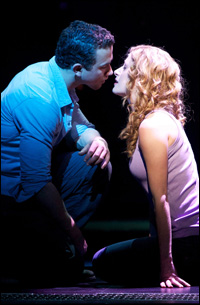 |
||
| Fleeshman and Caissie Levy in Ghost. |
||
| photo by Joan Marcus |
RF: Yeah, Caissie gives me the lowdown on where I've got to go. To be fair, she takes me to most of the places herself, because we're best friends. It's good to have her knowledge. She's returning the favor, of course, because I did that for her when we were in London for a year. Do you have any favorite cast hangouts, pre- or post-show?
RF: Definitely not pre-, because I think it would be dangerous if this cast got together and then tried to do the show — that could be terrible. [Laughs.] But afterward, yeah, we've found a few good places. And everyone goes to Kodama. It's just the best sushi place I've ever been to, so I love it there. For drinks, I've found a few nice local pubs and bars in Midtown, but nothing crazy. Our director, Matthew Warchus, took us out to Soho House, and that was lovely.
Had you spent time in New York before this?
RF: I spent a weekend here when I was 16, and that's it. I remember that I saw A Chorus Line and The Drowsy Chaperone.
You got your breakout television role as a regular on the long-running British soap "Coronation Street" at the age of 12. In addition to other notable TV appearances, you released a pop-rock album in 2007. Last year, when you were cast in Ghost, were you actively looking to add more theatre to your resumé?
FR: Yeah, well, I was so intrigued with the project and, more to the point, the people who were involved. Having Matthew Warchus directing was such a huge incentive, because he comes with such credentials, and his creative team has been involved with all these great shows that have come before. Not to mention the fact that Glen Ballard and Dave Stewart were writing the songs. All these things were pointing me in the right direction. The more I got to know about the show, the more I desperately wanted it. It went on a long time; towards the end, by the final few auditions, I was terrified because I wanted it so much.
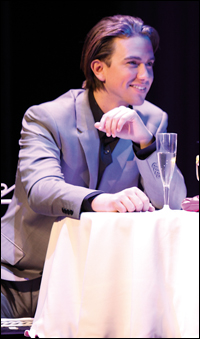 |
||
| Fleeshman in Legally Blonde. |
||
| Photo by Ellie Kurtz |
RF: I'd been on tour and onstage with my music, but in terms of musical theatre, my only professional credential was as Warner in Legally Blonde. I had a brilliant time with that, and it taught me so much. It was great to work with Sheridan Smith, who was taking the West End by storm with her performance as Elle. Before that, I'd only ever done amateur stuff when I was a kid.
I've read various reports that you were in talks to either replace Daniel Radcliffe in Equus on the West End or lead the Equus tour in the United Kingdom. What happened there?
RF: Yeah, I was very much in talks to go on the tour, actually, but the tour was going to go on for a lot longer than I'd necessarily thought out, and just one thing led to another, so we ultimately decided I wouldn't take part.
But you were ready to bare all for the role?
RF: I've never done it before, but both my parents have. I'm not one for nudity for no reason, which just seems pointless, but it's so vital in Equus. So I think I had gotten my head around it, but there's a huge difference between getting your head around it and actually doing it. I'm certainly not against it. If another part calls for nudity one day, I'd potentially do it.
You grew up in Manchester in a family of actors. When you first became interested in acting, was theatre always a part of your game plan?
RF: I wouldn't say that I had a game plan, and I still don't. This industry is so precarious. As an actor, I want to play lots of different parts, and it doesn't matter what medium that comes in, whether it's onstage, on film, or on TV. A great script and a great part is what gets me. I was really lucky I got to experience TV and film early on. Sort of switching over to theatre now, I've learned so much, not only about the business but also about holding on to those professional qualities that enable you to go out there every night and do a show like this one. I've gotten to work with some amazing people who've taught me a hell of a lot.
What was your earliest exposure to live theatre?
RF: From really young, I went to see my parents in shows. When I was six years old, I went to see my dad in A Midsummer Night's Dream something like 16 times. I remember that the guy playing Puck had these little florescent things as the magic he'd drop into the peoples' eyes. So yeah, I caught the bug quite young. Now I think sitting through 16 Shakespeare shows would be a bit of a struggle. Did you have a particular actor's career that you admired and wanted to emulate?
RF: When I was young, because I was a musician as well, I'd look at Elton John and want to be like him. But then I'd look at John Travolta in "Grease" and go, "I want to be Danny Zuko!" Then I'd look at Al Pacino and want to be in the "Godfather" films. I wanted to do everything, which I think you should. That hasn't gone away. I'm still quite schizophrenic, doing one thing one minute and doing another the next. But I'm lucky to have all those opportunities, so I'm not going to complain.
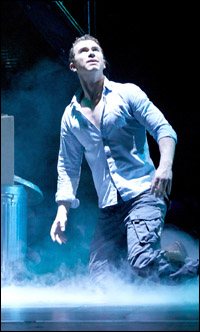 |
||
| Fleeshman in Ghost |
||
| photo by Joan Marcus |
RF: So much. For a year when we were touring together, I watched him be the most professional, hardworking person. It didn't matter what else was going on, he gave 40,000 people the most amazing show every night. That speaks volumes to why he's still around and still successful after all these years. Other than that, he's been incredibly supportive of me. Not to mention the incredible opportunities he's given me, but he'll still send me emails on first nights, wishing me luck, and it just means the world to have someone like him supporting me like that.
You've been with Ghost since its Manchester tryout in early 2011. Did you have an active part in crafting your role in terms of things like dialogue and vocal arrangements?
RF: Oh, absolutely. For both me and Caissie, it was the first time we had originated a part, and we had no clue how integral our role was in that. It's lovely to think that, if Ghost The Musical is still running somewhere in 20 years' time, the reason that the character walks stage left at that moment is because I decided to, or that the reason that melody line goes like that is because that's how I sang it. It's an incredible thing to leave your handprints on something. It's something I may never get the chance to do again, so I feel very privileged.
I've read that you had a near-death experience during rehearsals.
RF: Well, it wasn't near-death, but it was certainly bad. I was in London, in Soho, where the streets are very tiny and winding. I was standing out on a corner with my friend Andy Langtree, who was playing Carl. We were just two weeks into the rehearsal process, so it was all very early stages, and I got hit by a car. The car drove over my foot and broke my ankle in two places. So you can imagine now I felt, having just landed this dream role, knowing all the stunts and whatever else the show required, and I'm suddenly in hospital having an operation on my foot. The doctor said, "You're not going to be walking for about nine weeks." And I said, "Well, we open in seven." It was the worst experience ever. But the producers were amazing, and they got the best people to look after me, and I made it on to the first night.
Because you were briefly in the wrong place at the wrong time, Ghost could have gone on without you.
RF: Very early on, Bruce Rubin, who's very British in his approach to everything, said, "This is something that eventually you'll look back on as something that was meant to happen." Whether you believe that kind of thing or not, it was lovely to have his calming influence. He helped me see the positive in it. It definitely helped me as an actor to get that take on a situation where everything can be taken away in one second.
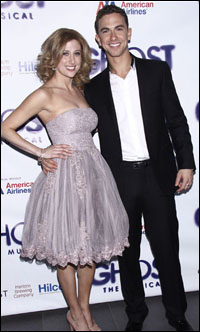 |
||
| Fleeshman and Caissie Levy on opening night |
||
| Photo by Joseph Marzullo/WENN |
RF: Initially, I didn't even think about it, because I was so excited by the possibility of doing the job. Then I got the job, and people started asking me about that in interviews and things like that, saying, "How do you feel about landing this part that Patrick Swayze made famous? You must be terrified!" I was like, "Well, I wasn't until you just said it." Yeah, then the pressure hit home, and I realized that I was holding a lot of responsibility. When you're taking on a film that people hold so dear to them, you have to be careful with that. Caissie and I were very grateful to our creative team for giving us the freedom to find our own way with the characters and not just become doubles for the film. But without a doubt, there's obviously enormous pressure, because you don't want people to have an adverse reaction to your performance. Now, after we've had really nice feedback for a year, we can turn that on its head and say, "Wow, isn't it amazing that we get to play Sam and Molly every night? How wonderful that we're the only people who've gotten to do that other than Patrick Swayze and Demi Moore." Now we just feel really grateful.
You were about one year old when Ghost was released. What's your relationship to the film?
RF: I didn't know it incredibly well, but when I heard about the audition, the first thing I did was watch the film. Now, of course, I avoid it like the plague, because I think it would throw me so much. Maybe one day, when I'm no longer playing Sam Wheat, then I'll sit down and watch it and freak out. Now I'll text Caissie, like, "Don't turn on channel 4."
Lisa Niemi, Patrick's widow, came to opening and said complimentary things about both you and the show. What was that like for you to have her there?
RF: I didn't actually know she was there until the curtain call, when Matthew Warchus mentioned it. To be honest, that was probably a good thing, because it would've weighed on my mind. It was an amazing thing to have her there. Obviously, it's such a shame that we weren't able to have Patrick there, but it meant the absolute world that she came and said that he would've liked it. She was very giving and very lovely to me. It must've been a crazy and very difficult night for her, but she handled it amazingly.
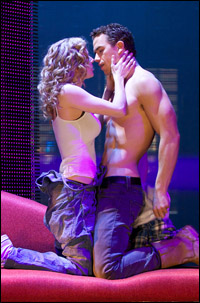 |
||
| Caissie Levy and Richard Fleeshman in Ghost. |
||
| photo by Joan Marcus |
RF: It's really nice to come here with no preconceptions and just be a part of the show, which we're all very proud of. It's also been lovely for Caissie and I to have the continuity of playing Sam and Molly in London for a year and now bringing it over here with a new cast. The audiences are also so vocal over here, which is one immediate difference that I've noticed, but that just helps our show, because there's a lot of laughing, and we often get massive rounds of applause for some of the illusions. It's lovely to have that energy from the audience every night.
But now you're doing an American accent in front of critical Americans.
RF: Yeah, there's definitely a huge difference between doing it in front of 1,500 natives and doing it front of 1,500 English people, who were like, "Yeah, it was great." Touch wood, everyone so far seems to have been OK with it. I haven't had any hate mail just yet. Your muscular physique has been a major part of the marketing for the show on Broadway. Was that also the case in London?
RF: I don't know about that. But there is that one kind of porno picture used in advertisements here, and I rang my mom and said, "Mom, I know you're coming to see the show, so you should know that there's a picture of me half-naked and having sex outside the theatre." It was an interesting conversation.
Would you say that Ghost has gotten racier for Broadway?
RF: What Caissie and I have found is that now, as actors and as people, is that we're allowing ourselves to go even further. There might be scenes that have gotten a little steamier because that's what happens after a year of getting more and more comfortable with each other. There's definitely more kissing.
It's one thing to have a passionate love scene, but yours is accompanied by racy film footage of your love scene projected onto the stage.
RF: I don't even think about that now, because we don't see it and we're in the moment ourselves, but the funniest thing was when we filmed that. We did it during week one of rehearsals, when Caissie and I barely knew each other. We'd met only a few days before. They were like, "We need to film this stuff, so you guys need to get really into it." It was pretty intense. The great thing is that we've never had issues with one another since then. It was baptism by fire, which was probably the best way to do it.
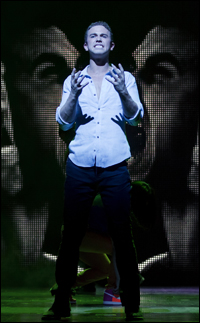 |
||
| Fleeshman in Ghost. |
||
| Photo by Joan Marcus |
RF: Anne Hathaway was recently asked of her appearance as Catwoman if she'd been working out, and she said something like, "If you had to wear a cat suit in front of the entire world, what would you do?" So, yeah, there's no better incentive, really. I try to get to the gym often, but the show is also incredibly hard work, so it's keeping us fit as it is.
Your good looks and the romantic nature of your role have positioned you as one of Broadway's new matinee idols. Have you had any interesting fan interaction at the stage door?
RF: Yeah, there was a lady that asked me to sign her breast, which was quite interesting. I tried to be as gentlemanly as possible as I put my signature on. I don't know why she wanted it on that particular area, but she was adamant, and it was certainly a perk of my day.
You also make yourself available to fans on Twitter.
RF: Twitter's great. I love getting that immediate response from the community who came to see the show that night. Because they chose to come see this show, and it was this one special moment just for the people in that room, so to get that feedback from them is really lovely.
Ghost's visual effects are very impressive. Have you ever felt like you had to compete against that so as not to be overshadowed by the spectacle?
RF: No, not at all. The show's incredibly epic, but the thing that really leaves the audience telling other people that they have to see this show is because it touches them, and that's what's integral to the show. They don't cry because someone walked through a door; they cry because Sam and Molly can't be together anymore. But we're so proud of every element of the show. The irony is that the actors are so unaware of what's going on behind us a lot of the time. About 80 percent of that stuff I've never even seen because I'm onstage facing out front.
After the opening night curtain call, Warchus implored the audience to spread the word about Ghost and push back against "snobbery" from some New York theatre critics. Do you share his outlook on that subject?
RF: I very often share outlooks with Matthew Warchus. What's interesting about his perspective on this whole thing is that he's been a part of every type of show. He's been the toast of town and won awards on both sides of the Atlantic, so he's been there and seen it all. So I think what he said was very intelligent and intuitive. I'm very proud of the show, and I know he is as well. Ghost received Tony nominations for its lighting design, scenic design, and supporting actress Da'Vine Joy Randolph. Do you feel that the show was unfairly snubbed in other major categories?
RF: Honestly, and I can't emphasize this enough — and maybe being an Englishman helps — but I'm so out of the loop with all these things. I didn't even know the Tony nominations were being announced that morning, and I got all these texts, like, "Are you watching?" "Are you watching?" I panicked, like, "Watch what? What's happened?" [Laughs.] I put on the tube thinking something terrible had happened. So yeah, I'm just thrilled to have brought this show, which has changed my life, to New York. That's all I could've asked for. Awards are lovely, but that's not why we do it. There's no reason to get caught up in that stuff.
View highlights from the show:


Evan-Zimmerman-for-MurphyMade.jpg)






